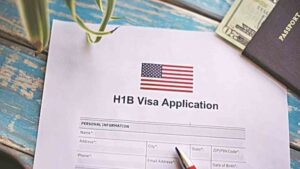Elon Musk, whose net worth recently surged to $400 billion, has a remarkable journey that began with working illegally in the United States decades ago. Today, his company Tesla heavily depends on H-1B workers, even becoming one of the top 25 employers of H-1B visa holders, according to U.S. Citizenship and Immigration Services (USCIS) data.
In 2019, about 580,000 people were on H-1B visas in the U.S., according to USCIS. However, President-elect Donald Trump may tighten H-1B visa rules after taking office on January 20, 2025.
In 2020, Trump attempted to reduce immigration by issuing an executive order that suspended the issuance of H-1B visas and barred entry to visa holders. He argued that it would protect American jobs during the COVID-19 pandemic, though the order was struck down as it was beyond the president’s authority.
Must Read: MEA: All Indians Wishing To Return From Syria Successfully Repatriated
Each year, the U.S. caps H-1B visas at 65,000, with an additional 20,000 available for U.S. advanced degree holders.
Ajay Srivastava, Founder of the Global Trade Research Initiative (GTRI), noted, “Trump’s stricter immigration stance could lead to changes in visa rules, impacting Indian IT professionals and raising costs for Indian IT companies.” Trump’s restrictive immigration policies during his first term raised concerns about the future of the H-1B program, especially regarding denied visa renewals and the challenges faced by skilled foreign workers trying to secure jobs.
Yet, with Elon Musk playing a key role in the newly established Department of Government Efficiency, and having had 1,787 H-1B visas approved for Tesla employees this year, a potential clash of interests looms. Musk, also known as “technoking,” began his career in the U.S. by working illegally on a student visa for a Stanford University program he never enrolled in.
Must Read: Accenture CEO Julie Sweet Locks X Account Amid Backlash Over Allegations In Atul Subhash Case
David Sacks, another tech executive involved in the Trump administration, could also push for more H-1B visas. During a podcast on All-In, co-hosted by Sacks, tech investor Jason Calacanis, and other entrepreneurs, Calacanis asked Trump whether he would expand H-1B visas for tech workers.
Calacanis said, “The more important point, I think, Mr. President, is we need high-skilled workers in this country. Can you please promise us you will give us more ability to import the best and brightest from around the world to America?”
Trump responded, “I do promise, but I happen to agree, that’s why I promise. Otherwise, I wouldn’t promise.”
However, his campaign later walked back the promise, stating that only “the most skilled graduates who can make significant contributions to America” would be allowed to stay, after “the most aggressive vetting process.”
It will be interesting to see how the new administration navigates the potential challenge of balancing Musk and Sacks’ push for H-1B visas with the broader goals of immigration reform.
Also Read: Only 19 Indians Remain in Russian Armed Forces, Government Confirms












